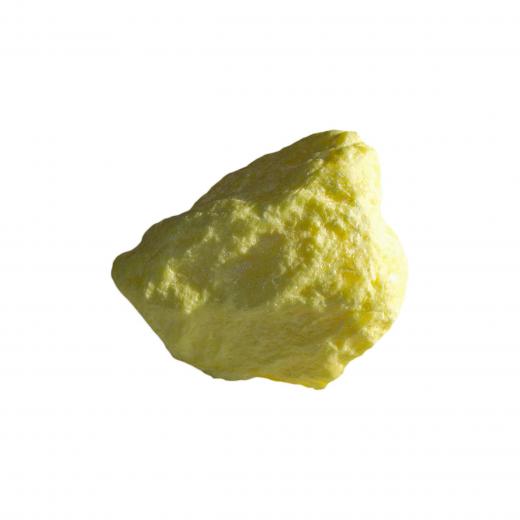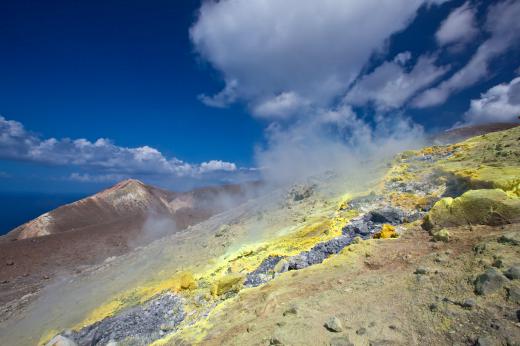What is Sulfur?
 Mary McMahon
Mary McMahon
Sulfur is a nonmetallic chemical element which appears in numerous forms and compounds. It is used extensively in many industries, as are its ions, such as sulfides and sulfates. In addition to having industrial applications, sulfur is also an important part of all living organisms, and it is also used as a food source by some bacteria, such as those found around hydrothermal vents.
On the periodic table of elements, sulfur is identified by the symbol S. The element has an atomic number of 16, and a number of different ions. An ion is a form of an element which has gained or lost electrons, changing the chemical structure and electrical charge of the element. Many consumers are familiar with sulfites, sulfur ions which are used in the preservation of many food products. Sulfates, another common ion, are used in a number of applications.

There is some dispute over the spelling of sulfur. In the United States, and many other countries, the word is “sulfur.” In nations which use British English, the name is more usually spelled as sulphur. Although both spellings are recognized as correct, “sulfur” is actually more etymologically correct, reflecting the Latin roots of the word. In an attempt to standardize the spelling, most chemists try to use an “f”.

In pure form, sulfur has a number of allotropes. Allotropic elements are elements which can have a number of pure structures; carbon is a well known allotropic element, appearing in the form of both diamonds and coal. Most of the allotropes of sulfur are crystalline in structure, although one is more plastic in nature. The most well known one appears in a yellow, odorless crystalline form which is also rather brittle. Many people are surprised to learn that sulfur is odorless; the rotten egg scent associated with this element is actually hydrogen sulfide, a dangerous sulfur compound.

The extremely reactive element is used in a number of applications including the manufacture of gunpowder, insecticides, and prescription drugs. It is also part of the vulcanization process for rubber, and it is the base for well-utilized compounds like sulfuric acid. In nature, sulfur can be found in compounds like galena and cinnabar, and it may also appear in pure deposits, especially around volcanoes and mineral springs.
Sulfur itself is generally safe to handle, but many of its compounds are more risky. Some are extremely toxic, and people should always be careful to follow listed precautions of chemicals like sulfur dioxide.
AS FEATURED ON:
AS FEATURED ON:

















Discussion Comments
My Irish grandmother gave all of us a tablespoon of powdered sulfur with molasses from age 5 and up. I never had a pimple or skin problems; beautiful hair and skin with the women. Of course, genetics plays a role but for family members who didn't have the sulfur they had sebaceous pustules (pimples) etc.
Also, when I had a seriously high fever as a little girl I was given - in addition to the sulfur and molasses -- a spoonful of chopped onions with a little sugar. My fever was broken within a day. Again, old fashioned remedies, but then there were no big pharmaceutical companies -- only elements of the earth, so it should not be surprising old remedies worked for hundreds of years and were free!
If your well has sulfur in it and the ppm is greater than 50, it will leave you in bad shape (dead). On the plus side, if the ppm of sulfur was greater than 100 ppm it would paralyze your olfactory nerves and you would not be able to smell it.
If you get frequent headaches, dizziness, vomiting then you might want to really worry. Call or buy an H2s sensor to test or maybe borrow one from a oil rig employee.
I heard about a really great hair product (virgin hair fertilizer) that's supposed to make your hair grow faster, i read a lot about it and it sounded great but it contains sulfur, isn't that a bad thing? to put it on your head, sound a bit dangerous?
I am allergic to sulfa drugs (Bactrim, a sulfa antibiotic) and Amaryl (a diabetes drug containing sulfa properties), and want to get my hair straightened with a product called FlowKeratin this week. Is this safe for me?
--Kathleen
where does sulfur get its color from and does it have more than one color?
Why is sulfur so prevalent near volcanoes or hot springs?
what are the chemical properties of the element sulfur?
what is it? where does it come from? what is it used in? and how can you use it economically to make profit?
what does sulfur look like?
what is it used in?
Hi my name is samantha soto. My question is, what exactly is sulfur in so i can watch out for it? Im allergic to it and i just want to be safe.
I'd like to know the answer to Ruthie's question. I just bought a house with Artesian Wells and have that telltale Sulfur odor. Is it dangerous to breathe it or use it over long periods of time to wash with or cook with or drink. I have filters but they don't eliminate the odor completely.
I just rented a home, and the water is from a well. I think it has sulfur because it has a very, very strong rotten egg odor. Does sulfur in water affect our health? We just use it for bathing and washing. We do not use it to cook or drink. Can we continue to use it?
Post your comments